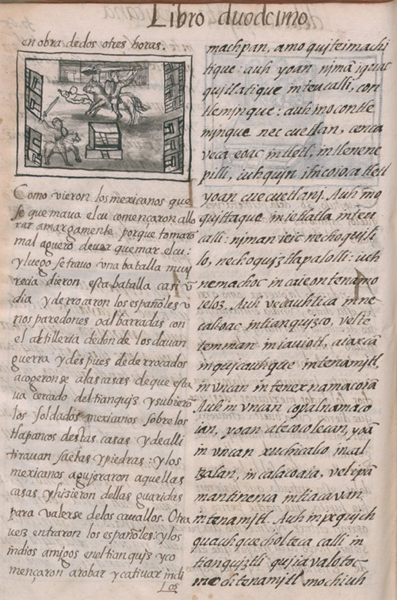Folio 68 verso
Translations and Transcriptions
Spanish Translation
[Translation of the Nahuatl into Spanish by Fr. Bernardino de Sahagún; transcription of the Spanish (left-hand column) by James Lockhart:] [f. 68v.] en obra de dos o tres horas. Como vieron los mexicanos que se quemaua el cu començaron a llorar amargamente porque tomarō mal aguero de uer quemar el cu: y luego se trauo vna batalla muy recia dieron esta batalla casi v̄ dia y derrocaron los españoles vnos paredones o albarradas con el artilleria de donde los dauan guerra y despues de derrocados acogeronse a las casas de que estaua cercado del tianquiz y subierō los soldados mexicanos sobre los tlapancos destas casas y de alli tirauan saetas y piedras: y los mexicanos agujeraron aquellas casas y hizieron dellas guaridas para valerse de los cauallos. Otra uez entraron los españoles: y los indios amigos en el tianquiz y començaron a robar y catiuar indios
English Translation
[Translation of the Nahuatl (right-hand column) by James Lockhart:]
they gave no sign of it.
And then was also when they burned the temple, setting fire to it. When they had set it on fire, it flared up; the tongues of flame rose very high, and the fire seemed to crackle and roar. And when they saw the temple burning, there was weeping and people greeted each other tearfully; it was thought that plundering was to begin.
Fighting went on for a long time in the marketplace; it was full of combat. It was a long time before they abandoned the walls at Tenexnamacoyan, Copalnamacoyan, and Atecocolecan. And at Xochicalco, where
Analytic Transcription
[Transcription of the Nahuatl (right-hand column) by James Lockhart:] [f. 68v.] machpan, amo quiteimachitique: auh yoan nimā iquac quitlatique in teucalli, contleminque: auh in ocontleminque nec cuetlan, cenca veca eoac in tletl, in tlenenepilli, iuhquin ihicoioca tletl yoan cuecuetlani. Auh in oquittaque in ie tlatla in teucalli: niman ie ic nechoquililo, nechoquiztlapalolli: iuh nemachoc in ca ie ontenamoieloz. Auh vecauhtica in necalioac in tianquizco, vel tetemman in iauiotl, aiaxcā in quicauhque in tenamitl, in vncan in tenexnamacoiā Auh in vncan copalnamacoian, yoan atecocolecan, yoā in vncan xuchicalco in caltzalan, in calacoaia, vel ipā mantinenca in tiacavan in tenamitl. Auh in ixquich quauhquecholtecacalli in tianquiztli quiiavalotoc moch tenamitl mochiuh
Image

Spanish Translation
[Translation of the Nahuatl into Spanish by Fr. Bernardino de Sahagún; transcription of the Spanish (left-hand column) by James Lockhart:] [f. 68v.] en obra de dos o tres horas. Como vieron los mexicanos que se quemaua el cu començaron a llorar amargamente porque tomarō mal aguero de uer quemar el cu: y luego se trauo vna batalla muy recia dieron esta batalla casi v̄ dia y derrocaron los españoles vnos paredones o albarradas con el artilleria de donde los dauan guerra y despues de derrocados acogeronse a las casas de que estaua cercado del tianquiz y subierō los soldados mexicanos sobre los tlapancos destas casas y de alli tirauan saetas y piedras: y los mexicanos agujeraron aquellas casas y hizieron dellas guaridas para valerse de los cauallos. Otra uez entraron los españoles: y los indios amigos en el tianquiz y començaron a robar y catiuar indios
English Translation
[Translation of the Nahuatl (right-hand column) by James Lockhart:]
they gave no sign of it.
And then was also when they burned the temple, setting fire to it. When they had set it on fire, it flared up; the tongues of flame rose very high, and the fire seemed to crackle and roar. And when they saw the temple burning, there was weeping and people greeted each other tearfully; it was thought that plundering was to begin.
Fighting went on for a long time in the marketplace; it was full of combat. It was a long time before they abandoned the walls at Tenexnamacoyan, Copalnamacoyan, and Atecocolecan. And at Xochicalco, where
Analytic Transcription
[Transcription of the Nahuatl (right-hand column) by James Lockhart:] [f. 68v.] machpan, amo quiteimachitique: auh yoan nimā iquac quitlatique in teucalli, contleminque: auh in ocontleminque nec cuetlan, cenca veca eoac in tletl, in tlenenepilli, iuhquin ihicoioca tletl yoan cuecuetlani. Auh in oquittaque in ie tlatla in teucalli: niman ie ic nechoquililo, nechoquiztlapalolli: iuh nemachoc in ca ie ontenamoieloz. Auh vecauhtica in necalioac in tianquizco, vel tetemman in iauiotl, aiaxcā in quicauhque in tenamitl, in vncan in tenexnamacoiā Auh in vncan copalnamacoian, yoan atecocolecan, yoā in vncan xuchicalco in caltzalan, in calacoaia, vel ipā mantinenca in tiacavan in tenamitl. Auh in ixquich quauhquecholtecacalli in tianquiztli quiiavalotoc moch tenamitl mochiuh
Image
